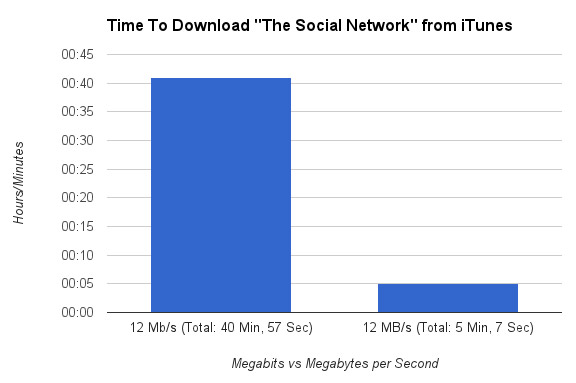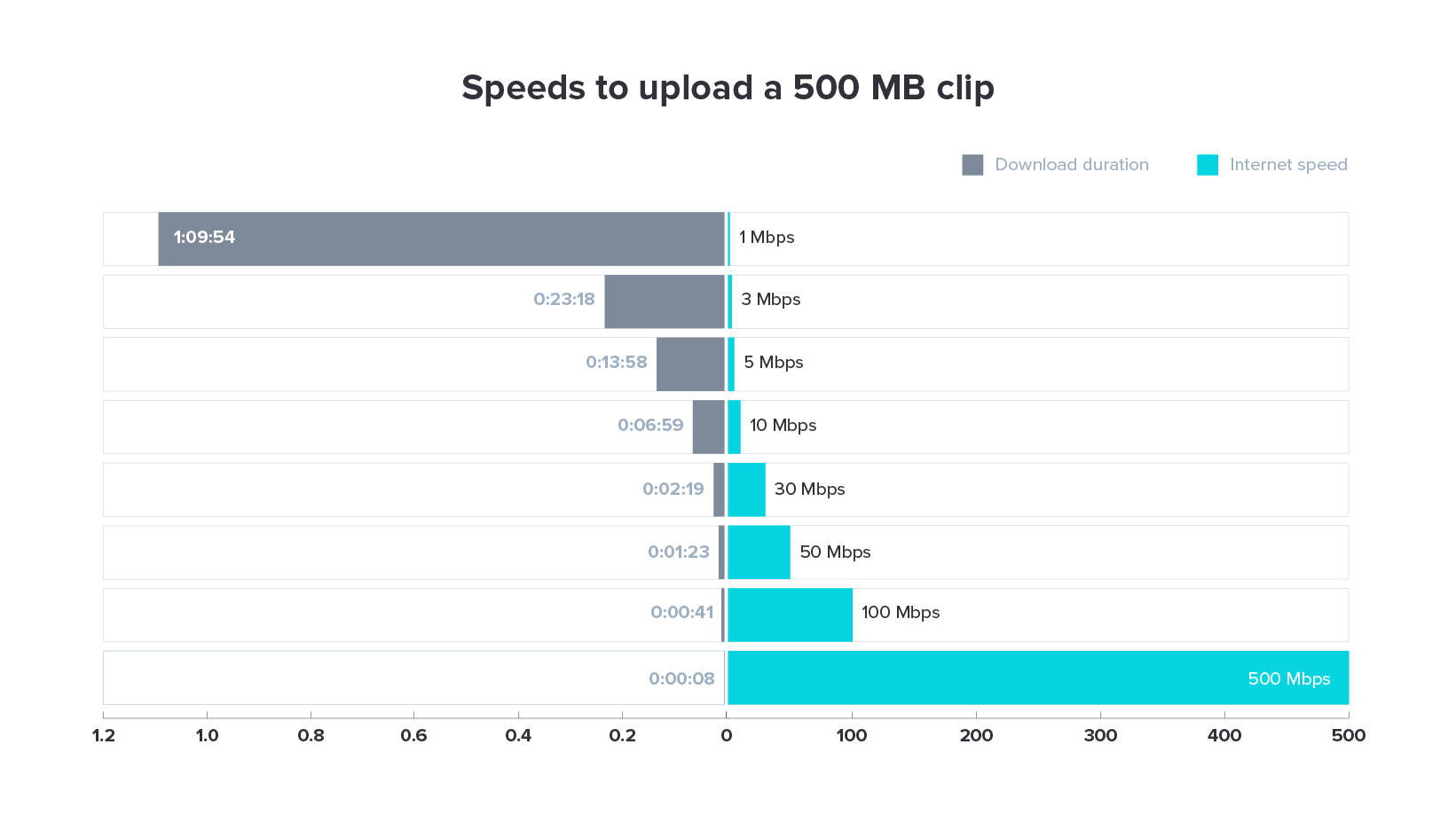Why Megabits Per Second Make A Difference for Remote Job Effectiveness
Wiki Article
Exactly How Megabits Per Second Impact Your Online Activities
The idea of megabits per second (Mbps) plays a critical function in forming our on the internet experiences. As digital activities multiply, comprehending the effects of Mbps on gaming, streaming, and video conferencing comes to be significantly essential. Higher Mbps can boost efficiency and reduce disruptions, while poor rates might foster disappointment and inadequacy. Evaluating your household's certain requirements in regard to these rates is necessary, especially as numerous devices contend for data transfer. Yet, the nuances of how Mbps affects numerous online tasks call for further expedition, specifically as our dependence on electronic connection continues to evolve.Recognizing Megabits Per Second
When considering web rate, it's crucial to comprehend the principle of megabits per second (Mbps), which works as a typical dimension for information transfer prices. This metric measures just how much information can be transferred over a net link in one second, offering a clear understanding of efficiency capacities - Megabits Per Second. For context, one megabit is equal to one million bits, and Mbps is generally utilized to express bandwidth for various on-line activitiesA greater Mbps suggests a much faster internet connection, allowing users to carry out tasks such as downloading files, surfing internet sites, and taking part in on-line gaming a lot more effectively. For example, typical surfing needs around 1-5 Mbps, while streaming high-def video may demand 5-25 Mbps. Comprehending these needs is important for establishing the ideal web speed required for specific tasks.
Furthermore, the variety of tools attached to a network can impact overall performance. Multiple users streaming, video gaming, or downloading and install all at once can strain readily available transmission capacity, resulting in slower speeds - Megabits Per Second. Reviewing personal online behaviors and requirements is vital in choosing a web plan that aligns with one's demands, guaranteeing a smooth electronic experience
Streaming and Buffering Issues
Streaming high-def material has become a staple of modern-day on the internet entertainment, yet it is often gone along with by annoying buffering concerns. These disruptions can considerably interfere with the viewing experience, bring about frustration and potential loss of target market involvement. Buffering occurs when the data sent from the streaming service is not gotten swiftly enough to maintain a smooth playback, frequently because of inadequate web rate determined in megabits per second (Mbps)
Furthermore, real-time streaming can be impacted by network congestion, which occurs when several tools share the same transmission capacity. Consequently, optimizing connection speed and making certain ample Mbps is important for a seamless streaming experience. As streaming solutions remain to develop, recognizing the effect of Mbps on buffering issues remains crucial for customers seeking nonstop amusement.
Online Gaming Performance
The effect of net rate on online tasks extends past streaming, substantially influencing online pc gaming performance. In competitive video gaming, low latency and high data transfer are important for a smooth experience. A rapid link decreases lag, enabling gamers to respond quickly to in-game occasions, which can be the difference between triumph and defeat.Bandwidth, determined in megabits per second (Mbps), plays a vital duty in supporting multiple devices and gaming platforms concurrently. Insufficient data transfer can bring about went down connections or lowered video game high quality, negatively influencing gameplay. Online this post multiplayer video games require significant data transfer, particularly during peak pc gaming hours when numerous gamers are online.
Furthermore, the kind of game can additionally dictate the necessary net rate. Hectic first-person shooters require higher speeds to keep responsiveness, while turn-based strategy video games may work fairly well on reduced speeds. As on-line pc gaming proceeds to progress, with raising visual integrity and more complicated multiplayer atmospheres, the demand for greater Mbps will only increase. Players must ensure they have adequate net rate to enhance their pc gaming performance and general experience. Buying a durable net link is important for gamers seeking to maximize their efficiency and satisfaction.
Video Conferencing High Quality
In today's digital landscape, video clip conferencing quality is heavily affected by web speed, particularly in terms of data transfer and latency. High-grade video calls require sufficient bandwidth to transmit sound and video clip data effortlessly. Commonly, a minimum of 1.5 Mbps upload and download rates is recommended for standard interpretation video clip, while high-def video clip conferencing usually requires at the very least 3 Mbps.Latency, or the hold-up between sending out and receiving data, also plays a crucial role in the individual experience. Higher latency can lead to echo, lag, and disjointed interactions, which can prevent cooperation and interaction throughout conferences.
Moreover, several participants in a video seminar can stress available transmission capacity, necessitating also higher rates. Network congestion, commonly caused by simultaneous tasks like streaming or downloading, can better degrade video clip quality. Therefore, for organizations relying on video clip conferencing for remote cooperation, understanding the connection between megabits per second and general communication high quality is important for keeping productivity and improving virtual interactions.
Choosing the Right Net Plan
Choosing a suitable web strategy is essential for making sure optimal efficiency in different online activities, specifically in setups that demand high bandwidth, such as video clip conferencing and online video gaming. Megabits Per Second. When considering an internet strategy, it is necessary to site link evaluate both the speed and data allowance to match your details use requirementsFor households with several individuals taking part in synchronised activities, a plan offering greater megabits per second (Mbps) is advised. Commonly, a minimum of 25 Mbps appropriates for standard streaming and browsing, while strategies exceeding 100 Mbps are more suitable for even more intensive tasks. In addition, take into consideration the nature of your her latest blog online activities; video conferencing calls for at the very least 1.5 Mbps submit rate, while online video gaming may need a lower latency yet regular connection.
Endless data strategies can avoid strangling and interruptions, specifically if hefty use is anticipated. By thoughtfully selecting an internet strategy tailored to your demands, you can boost your on-line experience, guaranteeing smooth, undisturbed accessibility to your recommended activities.
Conclusion
In verdict, the significance of megabits per second (Mbps) in forming on-line tasks can not be overemphasized. Higher Mbps promotes smooth streaming, decreases buffering, enhances video gaming experiences, and makes certain premium video clip conferencing. Alternatively, insufficient data transfer can bring about frustrating disruptions and decreased performance throughout different jobs. A detailed understanding of specific or family Mbps requirements is crucial for selecting an appropriate net plan that adequately sustains diverse online activities and individual demands.

Normally, a minimum of 25 Mbps is ideal for typical streaming and browsing, while plans going beyond 100 Mbps are better for even more intensive tasks. Furthermore, take into consideration the nature of your online activities; video clip conferencing needs at the very least 1.5 Mbps publish rate, while online video gaming may require a lower latency however consistent link.
Report this wiki page